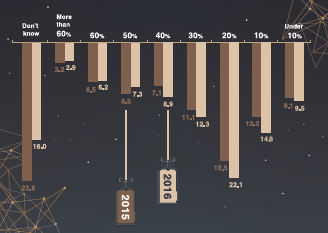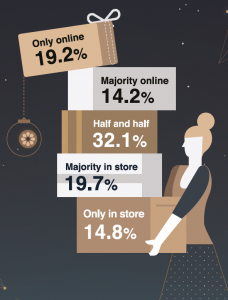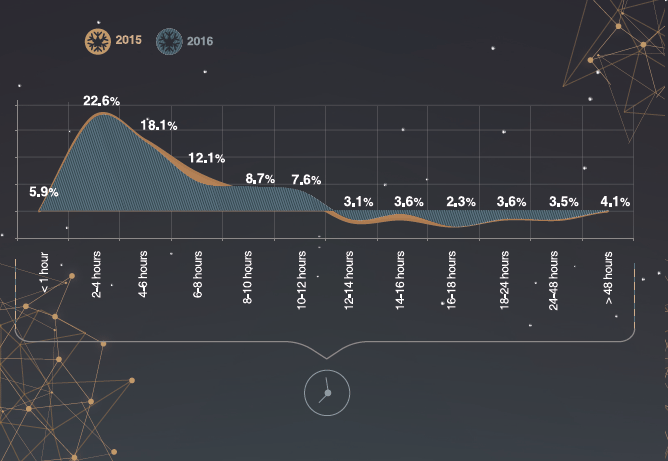Black Friday sales are expected to reach almost £1.7 billion this year, according to Webloyalty’s 2016 report on UK Christmas Trends, with a much more modest growth of 5.4% compared to 20% in 2015. This 25 November is set to be a start point for Christmas shopping for many UK shoppers again this year as 70% plan to buy all, most or some of their gifts on that day. That said, there’s seems to be a shift in consumer perceptions vis-à-vis the event and retailers must find creative ways to alleviate their reservations whilst protecting their profit margins.
Managing expectations is key
Although Black Friday is a relatively new event in the UK, consumers seem to have already developed a certain scepticism towards it with 60% saying “it fails to live up to the hype” and it’s “just too busy for their liking” while more than 55% find it “over commercialised.”
Although the report doesn’t elaborate on the reasons behind the shift, it could be the result of a change in consumer demographics. Millennials, who now represent the largest group in the workforce globally, are more focused on experiences “rather than buying stuff,” explains Lorna Hall, head of market intelligence at trend forecaster WGSN. They’re also more likely to “make an effort to buy products from companies that support the causes they care about.”
At the same time, those who plan to shop on that day are looking for an average discount just below 30%, but more than a quarter expect promotions of more than 40%. Considering the stakes, retailers must perform a balancing act if they want to attract reluctant consumers without putting their bottom line in the red.
A delicate balance
Almost 70% of UK consumers who plan to shop on Black Friday, say they’re simply making purchases they would have made at another time during the year. This might explain why retailers are reluctant to go all out on discounts. But they should keep in mind that other retailers may not. In a highly competitive environment with stagnating growth, retailers must find the right balance to meet customer expectations or they risk losing out to their competitors. Considering many retailers have invested into data analysis tools, they should use those to better target their discounts.
Reward your most loyal customers
Loyalty programs are a treasure trove of information on customers. Retailers who don’t want to reduce their already very thin profit margins by splashing out on promotions this year should consider using the data from their loyalty program to identify their best customers and reward them with the most generous discounts. Not only does that endear them to their most loyal patrons but it also allows retailers to better target those they already have a relationship with.
Personalise the experience
A generational study by Accenture shows that 60% of Millennials, 57% of Generation Xers and 46% of Baby Boomers want retailers to send them promotional offers based upon items they are considering online. Black Friday and Cyber Monday are perfect opportunities to tailor offerings and discounts to only those items customers want most. As a result, customers feel like retailers are paying attention and retailers don’t have to offer sweeping discounts that eat into their profit margins.
Create ethical choice discounts
Here again customer and visitor data should be useful to identify consumers belonging to the millennial generation. Since Millennials are more likely to “integrate their beliefs and causes into their choice of companies to support, their purchases and their day-to-day interactions,” according to Forbes’ Micah Solomon, retailers should consider creating “ethical choice” discounts. This would allow them to promote their more ethical brands while offering Millennials the kind of promotions they can get behind.
Offer special online discounts
A majority of consumers (61%) find Black Friday “too busy for their liking” and two-thirds say that “crowds of people are a major bugbear” during holiday shopping, says the report. This might explain why 65% of UK consumers plan to buy more than half of their gifts online this year, according to the report.
This is good news for retailers. It allows them to reap the rewards of all the investments they’ve made to their online presence and it helps reduce the crowds in store. In order to fully benefit from the move to digital, retailers should consider offering special online discounts.
It goes without saying that this move should be accompanied by a website as efficient as possible. One way to ensure this would be to create a temporary section listing discounted items just for Black Friday and Cyber Monday.
Free delivery is a great incentive
To avoid losing out on sales, retailers should also consider offering free delivery on less discounted items or on orders above a certain threshold. Shipping and handling costs often cause customers to abandon their shopping cart online, says David Bell of the Wharton School of Business. Free delivery might be a good enough incentive to convince some consumers to accept lesser discounts because convenience is a priority as they plan to spend even less time on average this year (9.7 hours) compared to last year (10.3 hours) doing their Christmas shopping, says the report.
Just like last year, Black Friday is expected to launch the Christmas shopping season this 25 November. That said consumers are more reluctant this year, because they feel the event doesn’t meet their expectations, while retailers are hesitating to splash out on discounts at a time when their profit margins are razor thin. The key to a successful season in this context, is in tailoring promotions using the new data analysis systems many retailers have put in place to offer just the right amount of discount to targeted customers.


